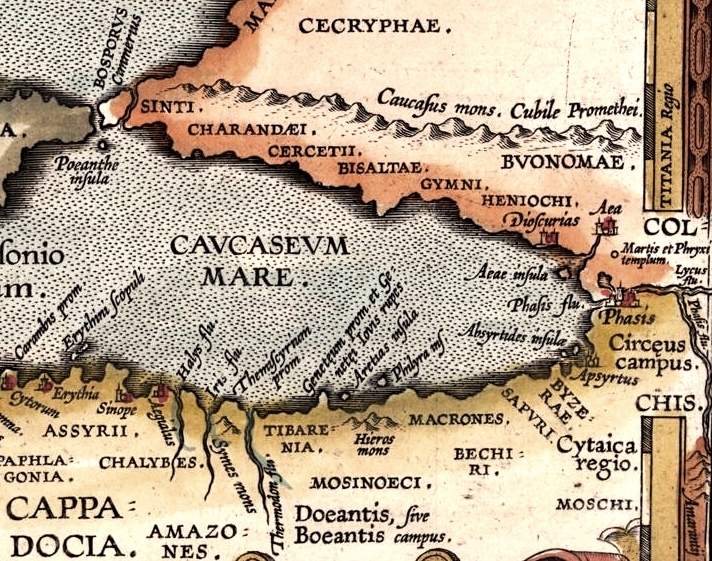Khaldi (people) on:
[Wikipedia]
[Google]
[Amazon]
 The Chalybes ( grc, Χάλυβες/Χάλυβοι, ka, ხალიბები, Khalibebi) and Chaldoi ( grc, Χάλδοι, ) were peoples mentioned by classical authors as living in Pontus and Cappadocia in northern Anatolia during Classical Antiquity. Their territory was known as
The Chalybes ( grc, Χάλυβες/Χάλυβοι, ka, ხალიბები, Khalibebi) and Chaldoi ( grc, Χάλδοι, ) were peoples mentioned by classical authors as living in Pontus and Cappadocia in northern Anatolia during Classical Antiquity. Their territory was known as
 The Chalybes ( grc, Χάλυβες/Χάλυβοι, ka, ხალიბები, Khalibebi) and Chaldoi ( grc, Χάλδοι, ) were peoples mentioned by classical authors as living in Pontus and Cappadocia in northern Anatolia during Classical Antiquity. Their territory was known as
The Chalybes ( grc, Χάλυβες/Χάλυβοι, ka, ხალიბები, Khalibebi) and Chaldoi ( grc, Χάλδοι, ) were peoples mentioned by classical authors as living in Pontus and Cappadocia in northern Anatolia during Classical Antiquity. Their territory was known as Chaldia
Chaldia ( el, Χαλδία, ''Khaldia'') was a historical region located in the mountainous interior of the eastern Black Sea, northeast Anatolia (modern Turkey). Its name was derived from a people called the ''Chaldoi'' (or ''Chalybes'') that i ...
, extending from the Halys River to Pharnakeia and Trabzon in the east and as far south as eastern Anatolia. According to Apollonius of Rhodes, the Chalybes were Scythians.
The Chaldoi, Chalybes, '' Mossynoikoi'', and '' Tibareni'', are counted among the first ironsmith nations by classical authors. , the tribe's name in Ancient Greek, means "tempered iron, steel", a term that passed into Latin as , "steel". Sayce derived the Greek name from Hittite , "land of Halys River". More than an identifiable people or tribe, "Chalybes" was a generic Greek term for "peoples of the Black Sea coast who trade in iron" or "a group of specialised metalworkers".
The main sources for the history of the Chaldoi are accounts from classical authors, including Homer, Strabo
Strabo''Strabo'' (meaning "squinty", as in strabismus) was a term employed by the Romans for anyone whose eyes were distorted or deformed. The father of Pompey was called "Pompeius Strabo". A native of Sicily so clear-sighted that he could see ...
, and Xenophon. In Xenophon's '' Cyropaedia'', Cyrus the Great
Cyrus II of Persia (; peo, 𐎤𐎢𐎽𐎢𐏁 ), commonly known as Cyrus the Great, was the founder of the Achaemenid Empire, the first Persian empire. Schmitt Achaemenid dynasty (i. The clan and dynasty) Under his rule, the empire embraced ...
helps the Armenians and Chaldians resolve a dispute over agricultural land.
In Roman times, the ''Chaldaei'' (homonymous but unrelated to the Semitic Chaldea
Chaldea () was a small country that existed between the late 10th or early 9th and mid-6th centuries BCE, after which the country and its people were absorbed and assimilated into the indigenous population of Babylonia. Semitic-speaking, it was ...
ns) and ''Chalybes'' are mentioned by Plutarch (''Lucull.'' c. 14) as settled in Pontus and Cappadocia, or the ''Pontus Cappadocicus'' section of the Roman province of Pontus.
Pliny the Elder mentioned the Armenochalybes, a tribe residing between Trebizond and Armenia.
Despite the ancient Greeks connecting the Chalybes to Scythians, some modern historians argue the Chalybes were a Georgian
Georgian may refer to:
Common meanings
* Anything related to, or originating from Georgia (country)
** Georgians, an indigenous Caucasian ethnic group
** Georgian language, a Kartvelian language spoken by Georgians
**Georgian scripts, three scrip ...
tribe. Historian Kalistrat Salia
Kalistrate Salia ( ka, კალისტრატე სალია) (1901–1986) was a Georgian émigré historian and philologist active in France.
Salia was born on July 18, 1901, in Mingrelia, western Georgia. He studied at Zugdidi and Khas ...
claims the Georgian ethnicity of the Chalybes is "indisputable". According to Sallia, the Zans
The Zans ( ka, ზანები, tr) or Chans ( ka, ჭანები, tr) are a subethnic group of Kartvelian people, speaking the Zan languages.
* Kartvelian peoples
**Georgians
**Zans (Mingrelians and Laz people)
**Svans
See also
* Kar ...
, a Kartvelian Kartvelian may refer to:
* Anything coming from or related to Georgia (country)
* Kartvelian languages
* Kartvelian alphabet, see Georgian alphabet
* Kartvelian studies
* Georgians
{{disambig
Language and nationality disambiguation pages ...
ethnic group from present-day Turkey, are their descendants. However, the one surviving word from the Chaldian language, ''Kakamar'' (the Chaldian name for the Black Sea), points toward an Indo-European connection.Robert H. Hewsen. ''Armenia: A Historical Atlas.'' University of Chicago Press. 2001.
See also
* HalizonesReferences
{{ReflistBibliography
* Giorgi Leon Kavtaradze: ''Probleme der historischen Geographie Anatoliens und Transkaukasiens im ersten Jahrtausend v. Chr.'', in: Orbis Terrarum 2 (1996) S. 191-216 * David Marshall Lang, ''Грузины. Хранители святынь'', Москва. Центрполиграф, 2006. pp. 71–72 Ancient peoples of Anatolia Iron Age Anatolia Tribes in Greco-Roman historiography Anabasis (Xenophon)